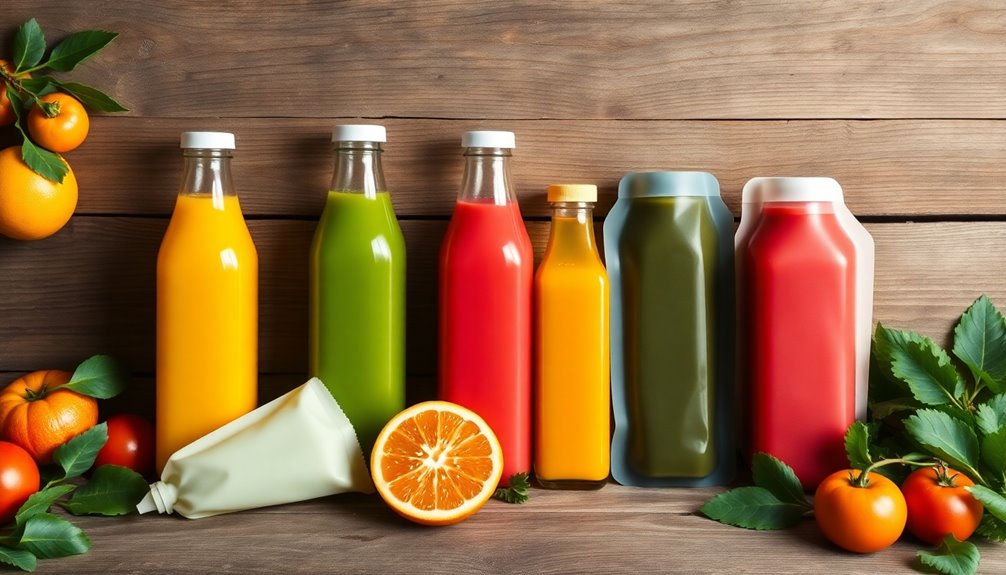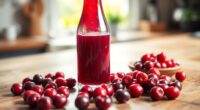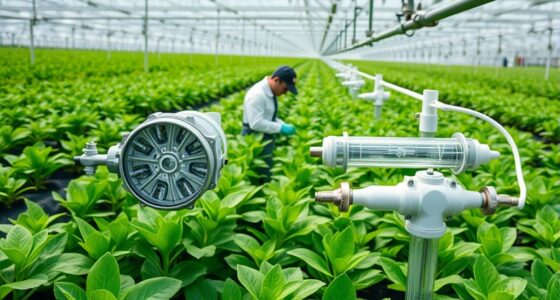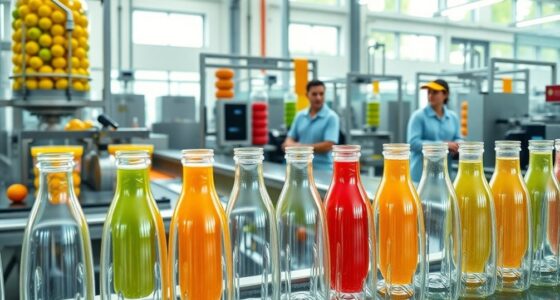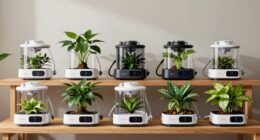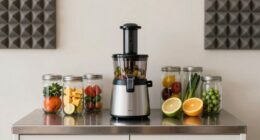If you're looking for eco-friendly juice packaging and storage solutions, you've got some fantastic options! Glass packaging preserves freshness and is endlessly recyclable, while aluminum cans are lightweight and save energy in recycling. Paperboard cartons are biodegradable and made from renewable resources. You can also choose refillable and reusable options to cut waste considerably. Smart packaging solutions can track product life and enhance recycling. Keep exploring to discover the best picks for a sustainable sipping experience!
Key Takeaways
- Glass packaging preserves juice freshness and flavor while being recyclable indefinitely, supporting a sustainable circular economy.
- Aluminum cans are lightweight, have a high recycling rate, and save significant energy during the recycling process.
- Paperboard cartons are made from renewable resources, biodegradable, and help minimize landfill waste.
- Refillable and reusable options promote sustainability by reducing waste and cutting emissions significantly.
- Smart packaging solutions utilize technology to enhance recycling processes and provide consumers with eco-friendly information.
Glass Packaging
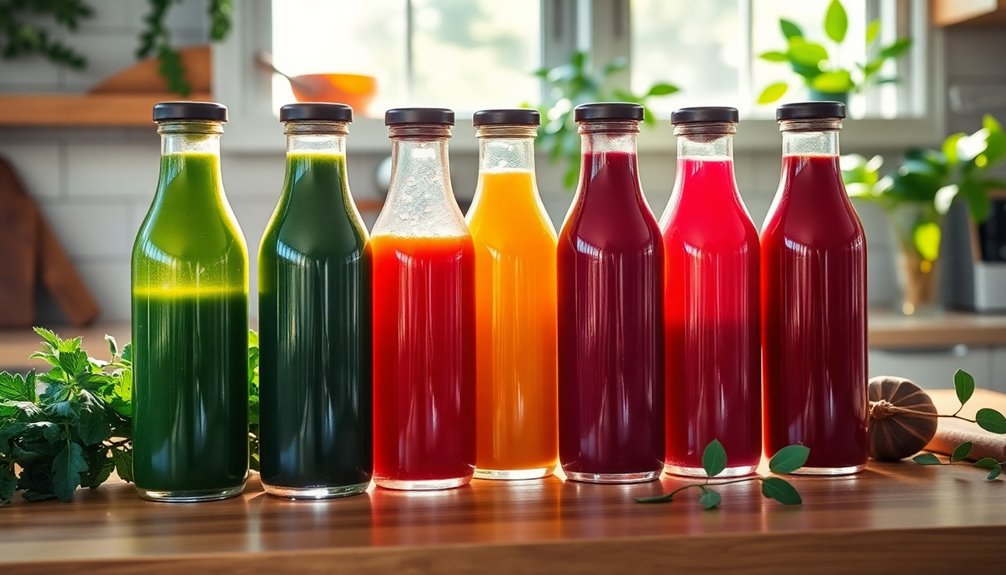
When you choose glass packaging for your juice, you're opting for a solution that's not only stylish but also incredibly sustainable.
Glass packaging stands out as a top eco-friendly alternative due to its ability to be recycled indefinitely, facilitating a circular economy. With a minimal negative environmental impact upon disposal, it offers a responsible choice for sustainable juice packaging.
You'll appreciate how easy it's to clean, which helps reduce your carbon footprint during distribution. Plus, glass effectively preserves freshness and flavor, giving you a quality benefit that plastic simply can't match.
Aluminum Cans
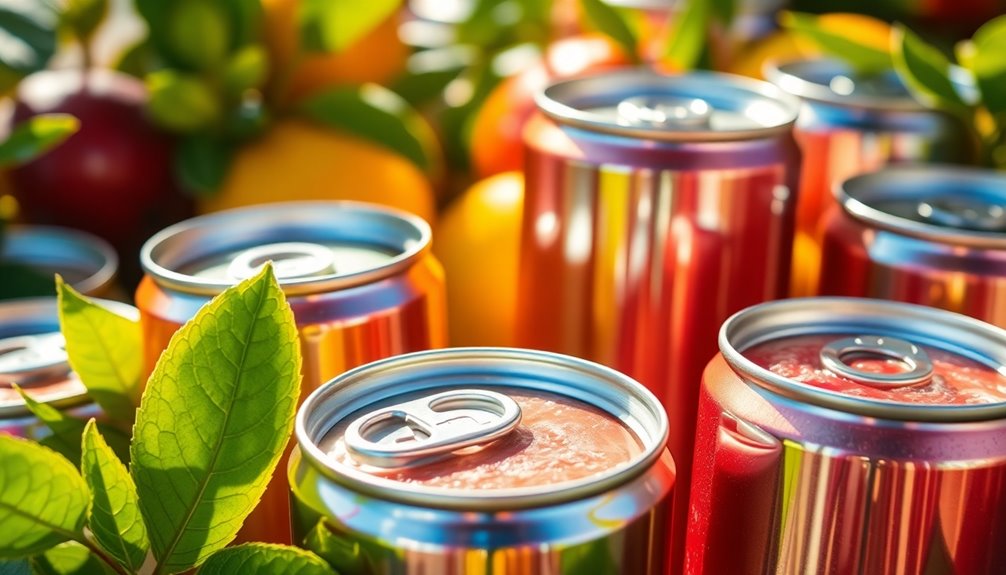
Aluminum cans offer a versatile and eco-friendly packaging solution for juice lovers everywhere.
With a high recycling rate of about 60% globally and even 67% in North America, aluminum cans stand out as sustainable packaging options. Their lightweight nature not only makes them easy to handle but also considerably reduces transportation-related carbon emissions.
Plus, aluminum cans can be recycled indefinitely without losing quality, contributing to a closed-loop recycling system. By recycling aluminum, you save up to 95% of the energy needed to produce new cans from raw materials, leading to impressive energy savings. Additionally, recycling aluminum not only conserves energy but also minimizes environmental impact, as it significantly reduces the need for new raw materials.
However, be mindful that some recycling facilities may not accept cans with certain coatings, which can complicate the recycling process.
Embrace eco-friendly practices with aluminum cans!
Paperboard Cartons
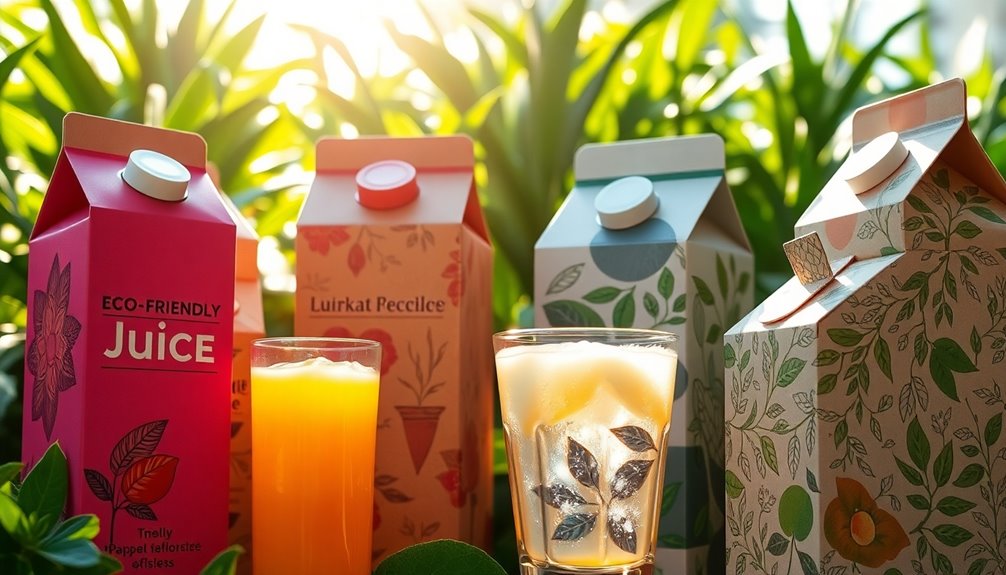
Paperboard cartons stand out as a sustainable choice for juice packaging, with around 70% of their composition derived from renewable resources. These cartons represent eco-friendly packaging solutions, offering biodegradable packaging alternatives that align with consumer demand for eco-friendly packaging. They're lightweight and compact, which helps in reducing waste during transportation and minimizes carbon emissions. While they protect juice effectively without preservatives, some areas may face challenges in recycling due to material separation. However, their biodegradable and compostable nature reduces landfill waste at the end of their lifecycle. Additionally, the use of paperboard cartons can contribute to reducing inflammation as they support a healthier environment through sustainable practices.
Minimalist Design
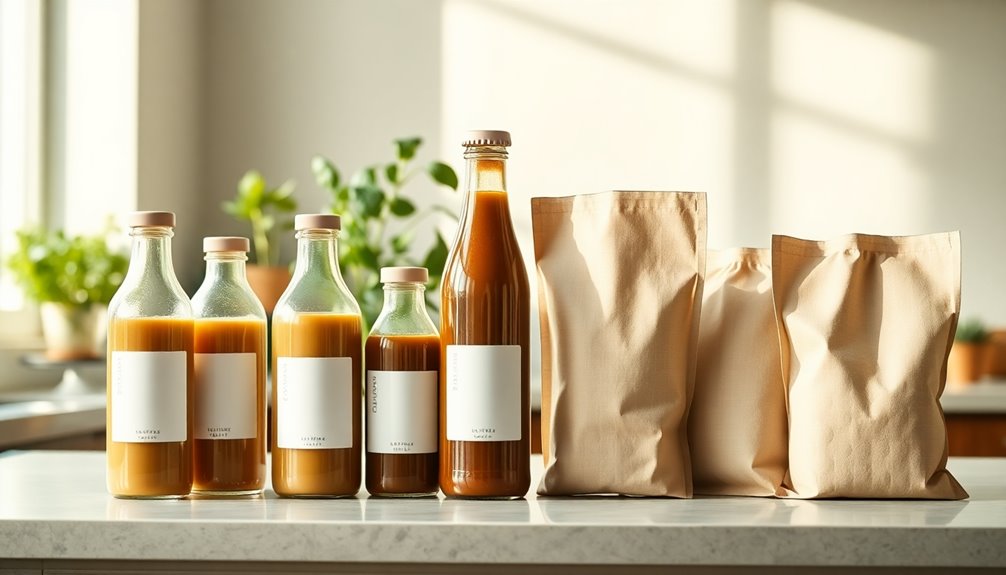
Eco-friendly packaging goes beyond just materials; minimalist design plays an essential role in enhancing sustainability. By focusing on simplicity, it reduces excess materials and waste, leading to a lower environmental impact.
Here are three benefits of minimalist design in juice packaging:
- Identifiable Eco-Friendly Options: It makes it easier for you to spot brands committed to sustainable practices.
- Lower Production Costs: Eliminating unnecessary components can lower costs and facilitate easier recycling processes.
- Reduced Carbon Footprint: The streamlined design allows for efficient use of space during transportation, helping packaging manufacturers cut down on carbon emissions.
Plant-Based Materials
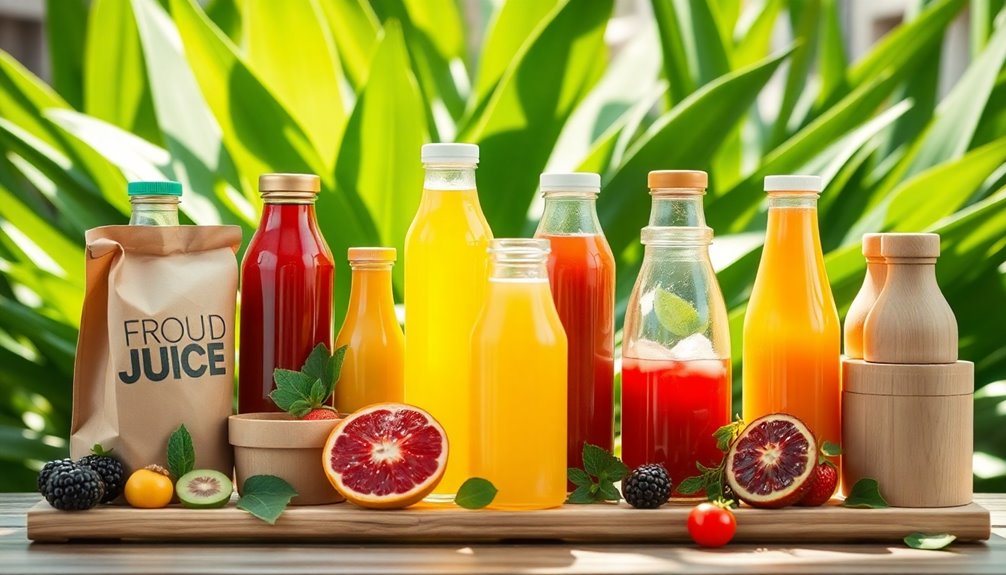
In the quest for sustainable packaging, plant-based materials are becoming a game changer. These renewable resources, like sugarcane and cornstarch, create biodegradable packaging that mirrors traditional plastics but with a markedly lower environmental impact.
For instance, packaging made from cornstarch decomposes in home composting systems within months, providing an eco-friendly alternative to petroleum-based plastics.
Additionally, mushroom mycelium offers innovative biodegradable solutions that are shock-absorbent and fire-resistant.
Seaweed-based packaging is another exciting option; it's flexible, durable, and even dissolves in water, enriching the soil when composted.
Refillable and Reusable Options
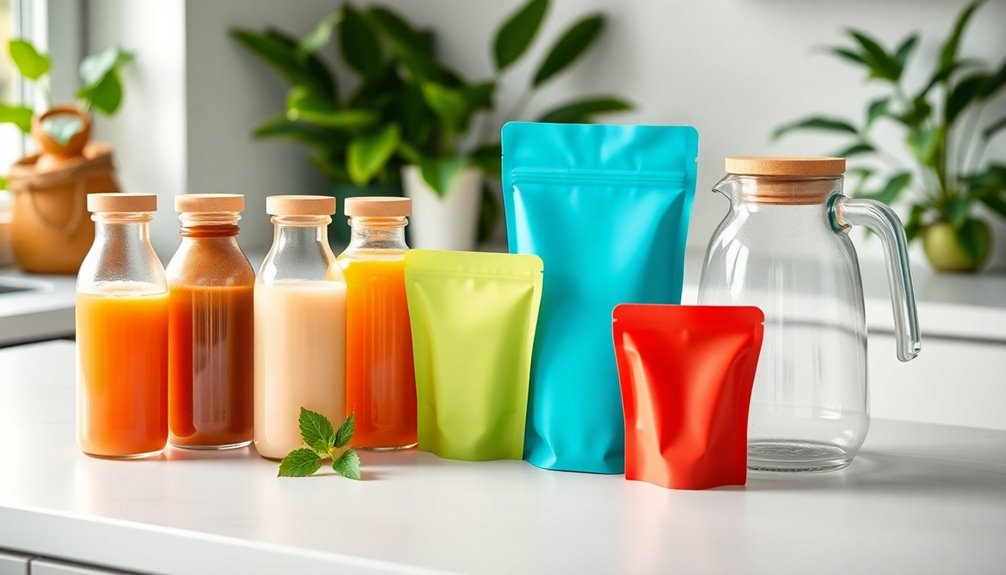
When you choose refillable and reusable packaging, you're not just cutting down on waste; you're actively supporting a circular economy.
Glass bottles, for example, can be used multiple times without losing quality, making them a smart choice for eco-conscious consumers.
Benefits of Reusable Packaging
As consumers increasingly seek sustainable choices, the benefits of reusable packaging, like refillable options, become clear.
By opting for durable packaging, you can help reduce plastic waste and support eco-conscious practices. Here are three key benefits:
- Lower Carbon Emissions: Research shows using reusable packaging can cut emissions by up to 70% compared to single-use alternatives.
- Enhanced Consumer Loyalty: Brands prioritizing refillable packaging foster stronger connections with customers who value sustainability.
- Support for Circular Economy: Utilizing refillable kegs and containers reduces environmental impact while encouraging repeated use, contributing to a more sustainable future. Additionally, the organic tea market is projected to grow, highlighting the increasing consumer demand for sustainable products.
Embracing these sustainable options not only benefits the planet but also enhances your overall juice experience.
Promoting Circular Economy Practices
Embracing refillable and reusable packaging options not only reduces waste but also plays a crucial role in promoting a circular economy.
By choosing reusable packaging, you help minimize packaging waste, cutting environmental impact considerably. For instance, using refillable glass bottles or kegs in the beverage industry can decrease resource consumption and production costs.
Studies reveal that adopting these systems can slash packaging waste by up to 80%, encouraging sustainable practices among both consumers and brands.
Plus, when you return and refill containers, you foster a sense of community around eco-friendly initiatives. Aromatherapy practices can also be integrated with these sustainable packaging solutions to enhance overall well-being during the consumption experience.
Businesses that implement these practices not only boost brand loyalty but also appeal to environmentally conscious consumers, ultimately driving sales and promoting a healthier planet.
Smart Packaging Solutions
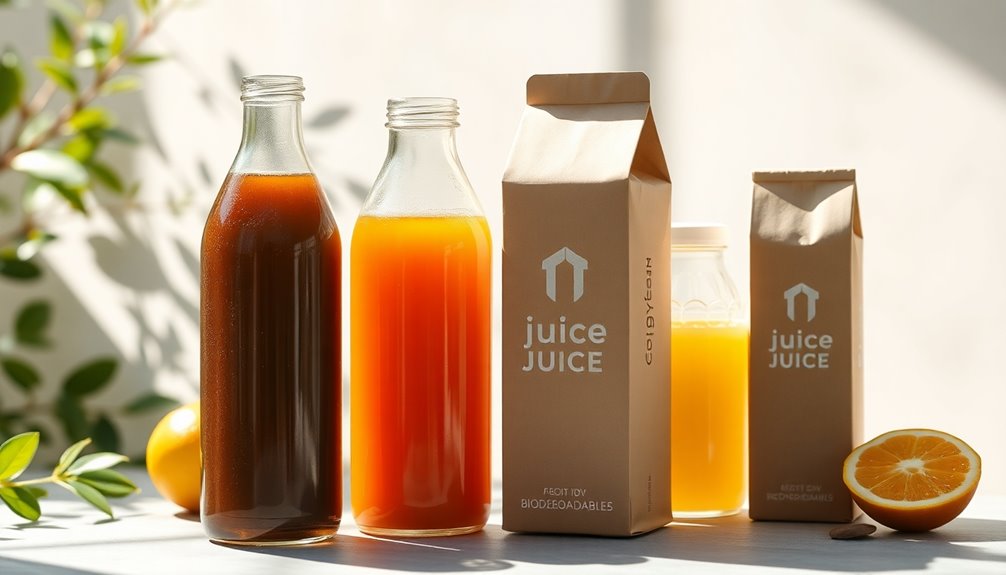
Smart packaging solutions revolutionize the juice industry by integrating advanced technology, such as QR codes and RFID labels.
These innovations enhance sustainability and consumer engagement, making your juice choices more informed. Here are three key benefits:
- Recycling Information: QR codes provide insights on proper disposal methods and eco-friendly packaging materials, promoting responsible recycling.
- Inventory Management: RFID labels help track the product lifecycle, reducing food waste and ensuring peak freshness.
- Circular Economy Support: Smart packaging maximizes recycling processes, contributing to a sustainable future. Additionally, the use of eco-friendly materials in packaging aligns with consumer preferences for sustainability.
Frequently Asked Questions
What Is the Most Eco-Friendly Drink Packaging?
When considering the most eco-friendly drink packaging, glass and aluminum stand out as top choices. They can be recycled indefinitely, promoting a closed-loop system that reduces waste.
If you're looking for alternatives, plant-based materials like cornstarch and seaweed offer compostable options that lower environmental impact. Refillable containers, such as glass bottles, also help you minimize single-use waste.
Choosing smart packaging with recycling information further encourages sustainable consumer habits, making a positive difference.
What Is the Best Eco-Friendly Packaging?
You know what they say: "One man's trash is another man's treasure."
When it comes to the best eco-friendly packaging, you should consider options like glass and aluminum, which can be recycled indefinitely. Aseptic cartons made from renewable paperboard are lightweight but tricky to recycle.
Don't forget about plant-based materials that compost easily and refillable glass bottles that cut down single-use waste.
Smart packaging with QR codes can also enhance your eco-friendly choices.
Is Eco-Friendly Packaging Good?
Yes, eco-friendly packaging is good! It helps reduce your environmental impact by using recyclable or biodegradable materials, which means less waste in landfills.
You'll appreciate that options like glass and aluminum can be recycled indefinitely, while plant-based materials decompose quickly without harmful residues.
Plus, choosing sustainable packaging boosts your brand's reputation and meets consumer demand for responsible products.
What Is the Most Eco-Friendly Alternative to Plastic?
Imagine a garden where nature thrives, untouched by plastic's grasp.
In this vibrant scene, plant-based materials, like cornstarch and sugarcane bioplastics, bloom as the most eco-friendly alternatives to plastic. They're compostable, nourishing the soil rather than harming it.
Glass dances in the sun, endlessly recyclable, while aluminum cans sing in harmony with sustainability.
With mushroom packaging and seaweed wraps, you embrace a world where waste turns to nourishment, leaving only beauty behind.
Conclusion
Choosing eco-friendly juice packaging and storage solutions doesn’t just benefit the planet; it transforms your everyday choices into sustainable habits. Picture a glass bottle gleaming under the sun, contrasting with a dull plastic container destined for a landfill. Imagine sipping from a sleek aluminum can, its recyclable promise standing strong against wasteful alternatives. By embracing minimalist designs and plant-based materials, you’re not just storing juice; you’re nurturing a healthier future. Every sip is a step toward sustainability, and you’re leading the way! Furthermore, choosing ecofriendly juice packaging solutions encourages a mindful approach to consumption that resonates with both your values and the wellbeing of the environment. As you navigate through options, consider how each choice can minimize your carbon footprint while enhancing the aesthetic of your kitchen. Ultimately, every eco-conscious decision contributes to a collective movement toward a greener planet, proving that individual actions truly can make a difference.
Cindy thoroughly researches juicing trends, techniques, and recipes to provide readers with practical advice and inspiration. Her writing style is accessible, engaging, and designed to make complex concepts easy to understand. Cindy’s dedication to promoting the advantages of juicing shines through her work, empowering readers to make positive changes in their lives through the simple act of juicing.

